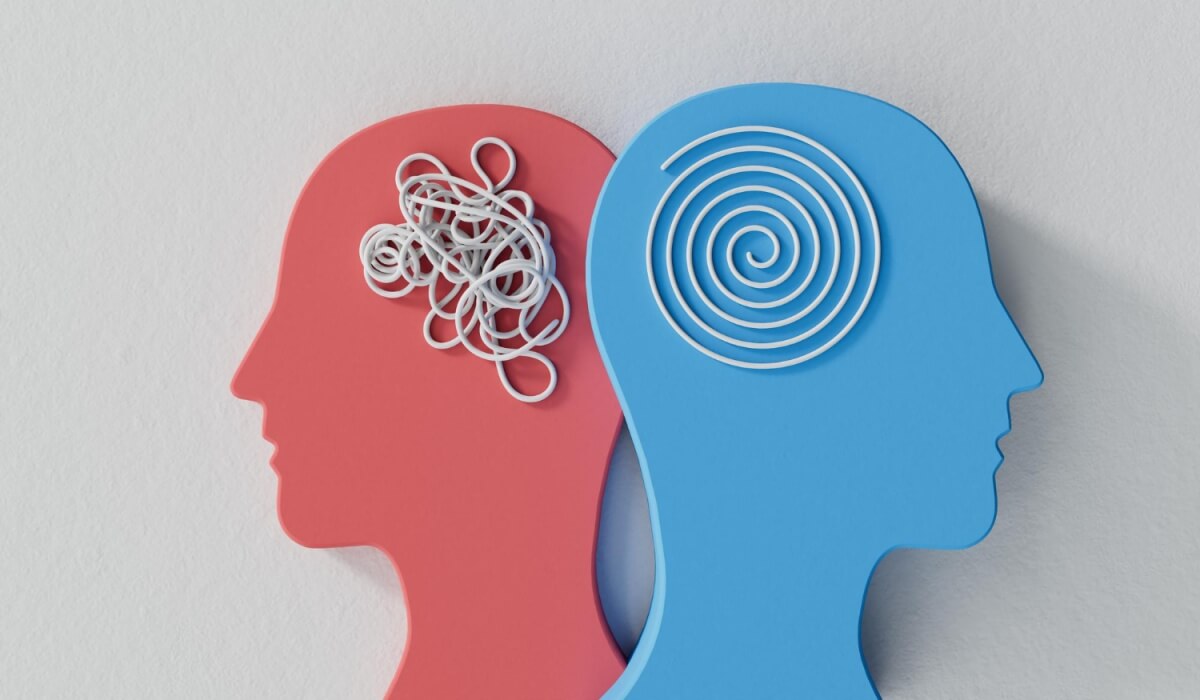Table of Contents
Self-perception and Self-regulation

Recognizing Own Emotions
The ability to recognize one’s own emotions forms the foundation of Emotional Intelligence and stress management. This self-awareness allows us to understand our reactions and respond appropriately, especially when stress is involved. By being aware of and reflecting on our own emotional states, we can also optimize stress management and thus contribute to effective Emotional Intelligence stress reduction.
Techniques for Identifying One’s Own Emotions
There are various methods to improve emotional self-perception that help us explore our inner states. Emotion journals, where we record daily feelings and related events, are a proven tool. Regular self-reflection can also contribute to clarity. It is helpful to take time and explore one’s own feelings in a quiet moment:
- Notice which physical signals occur – increased pulse, sweating, or trembling can be indicators of stress.
- Question which thoughts and situations evoke certain emotions.
- Reflect on how your emotions influence your thinking and actions.
With Improved Self-Perception to Emotional Stress Management
An example from work life illustrates how emotional intelligence is useful in handling stress: A project manager feels increasing tension due to looming deadlines. By recognizing his fear of failure, he is able to apply preventive stress management strategies. He begins with task prioritization, delegates responsibilities, and plans regular breaks for regeneration. This leads to a significant reduction in stress and a more productive work environment.
Emotional Intelligence is therefore not just a theoretical concept, but a practical skill that, once developed, significantly contributes to stress management and thus to a balanced life. By getting to know ourselves better and managing our emotions, we take decisive influence on our well-being.
Deliberately Managing Emotions
Emotional intelligence and stress management are inseparably linked. In a dynamic work life, often characterized by hustle and pressure, the ability to effectively manage and regulate one’s own emotions can make a crucial difference. It is the art of surfing the waves of emotions rather than being overwhelmed by them.
The foundation for this is the knowledge about one’s own emotional states. Those who know themselves well and can understand their emotions are more likely to respond appropriately under stress. This is a central aspect of Emotional Intelligence in stress situations, which is repeatedly tested in daily professional life. Imagine, for instance, a colleague criticizes your work unexpectedly sharply. Instead of reacting impulsively and possibly hurtfully, you can take a step back through a deeper understanding of your emotions. You analyze the situation, acknowledge your initial emotional reaction as normal, but then consciously decide on a constructive response. This self-regulation allows you to view criticism as an opportunity for personal development and to reduce stress.
Application of Emotional Self-Control
A real-life example: Imagine you are about to give an important presentation. Your pulse quickens, your hands become sweaty – classic symptoms of stress. By using stress management techniques, such as deep breathing exercises or positive self-talk, you can manage your nerves and optimize your performance. It’s no coincidence that many successful people find internal calm in such moments – they’ve internalized emotionally intelligent strategies that help them.
Besides such techniques, especially the ability to empathize plays a crucial role in Emotional Stress Management. It allows taking the perspective of others, thereby defusing conflict-laden situations at the workplace. An empathetic employee quickly recognizes the emotions of colleagues and can respond accordingly, which in turn lowers their own stress levels.
Practical Implementation in Daily Work
Emotional Intelligence stress reduction is not an innate ability but a learnable skill. Mindfulness training can help in becoming more aware of one’s own emotions. The goal is to recognize the early warning signs of stress and replace automatic reactions with well-considered responses. One method could be, for instance, to respond to stressful emails or messages not immediately, but after a short reflection break.
The deliberate application of Emotional Intelligence in professional life also contributes to health promotion. Studies have shown that people who manage their emotions well are less susceptible to stress-related diseases. Thus, it becomes clear that developing Emotional Intelligence and effective stress management strategies is essential not only to succeed in one’s career but also to lead a balanced and satisfying life.
Social Awareness and Relationship Management

Social Awareness and Relationship Management
The ability to recognize and correctly interpret emotional signals in others is a central pillar of Emotional Intelligence. In everyday life, often characterized by hustle and stress, Emotional Intelligence and stress management help maintain harmonious relationships and avoid conflicts.
The Importance of Nonverbal Communication
We transmit emotional messages not only through words but primarily through our body language. Studies show that nonverbal signals such as facial expressions, gestures, and mood account for up to 93% of the total emotional communication. Particularly in the professional context, the importance of Emotional Intelligence in reducing stress becomes evident: An attentive manager who takes the concerns of their employees seriously and acts accordingly can significantly improve the work atmosphere and thus increase productivity.
- Pay close attention: A frown, avoiding eye contact, or crossed arms can indicate discomfort.
- Listen: Not just what is said, but how it is said – tone and volume can reveal a lot about an emotional state.
- Reflect on the context: Emotional signals should always be considered in the current situational context.
Practical Application in Everyday Life
An example from daily life could be: You notice that a colleague during a meeting rarely seeks eye contact and projects a certain closed-off posture. By skillfully employing Emotional Stress Management, you could take this observation and seek a private dialogue after the meeting to address his apparent stress reaction. Your empathetic approach can contribute to a trusting atmosphere and lead to the colleague feeling understood.
Linking with Emotional Intelligence in Stress
Emotional Intelligence under stress enables correct action in stress-laden situations. Imagine a project nearing its deadline and the team is noticeably tense. Here, it is especially important not only to perceive emotions but also to respond appropriately. Perhaps the team needs a short break or an open discussion to reduce stress and soothe tempers.
The ability to interpret emotional signals and the application of Emotional Intelligence and stress management are not a luxury, but a necessity for interpersonal relationships and maintaining our mental health. By being aware of these significant aspects and actively applying them in everyday life, we can significantly shape our social environment positively.
Building Effective Relationships
Emotional Intelligence (EI) is a key to successful interpersonal relationships, especially in times of high stress. Emotional intelligence and stress management make it possible to not only handle pressure situations better oneself, but also to be supportive in the social environment.
Emotional Intelligence for Stress Reduction in Social Contexts
The social competency, which is part of EI, enables individuals to recognize emotions in themselves and others and respond appropriately. For example, a leader’s emotional wisdom helps to identify signs of overwhelm in a team member. With this knowledge, they can intervene supportively, thus reducing stressors at the workplace, which can be reflected in lower absenteeism and higher employee satisfaction.
Stress management also involves creating an atmosphere of trust and openness. A study from the Journal of Applied Psychology showed that teams with high emotional intelligence develop more effective communication and better conflict resolution skills. Such an environment encourages the expression of worries and concerns and counters the feeling of isolation.
Emotional Stress Management in Interpersonal Relationships
In personal relationships, EI enables the handling of stressful life events as a team. Couples, where both partners have high emotional intelligence, report greater relationship satisfaction according to the Journal of Personality and Social Psychology. They can tackle stressors as a joint challenge, which strengthens the bond and leads to greater resilience.
- Identification and expression of emotional needs contribute to better understanding.
- Empathy promotes a non-judgmental attitude and strengthens mutual trust.
- Effective communication skills help prevent misunderstandings and resolve conflicts constructively.
All these skills are part of emotional intelligence and support the building and maintenance of strong relationships.
Emotional Intelligence in Stress: Practical Examples
A practical example of the benefit of EI in stress is how a doctor communicates with the relatives of a patient. By managing his own emotions and simultaneously empathizing with their fears, he creates an atmosphere in which thoughtful and prudent decisions can be made.
Another example would be a teacher who uses emotionally intelligent techniques to create a stress-free learning environment. He can recognize when students are stressed and has strategies to reduce this stress, which ultimately leads to better learning outcomes.
By applying the principles of EI, one not only builds a stronger network for difficult times but also fosters an environment that supports growth and development. Emotional intelligence is thus not a luxury, but a necessity for thriving in a complex social world, both professionally and personally.
Summary
Emotional intelligence and stress management are crucial factors for a balanced life and high productivity at work. They enable us to recognize, understand, and appropriately respond to our own and others’ emotions, especially in stressful situations. By deepening our emotional self-awareness, stressors can be better identified and managed. Good Emotional Stress Management means consciously controlling our responses to challenging situations.
Techniques for Better Self-Awareness
The foundation of Emotional Intelligence in stress reduction lies in the ability to understand our own emotional states. This can be encouraged by regularly reflecting on one’s feelings:
- Recognizing physical symptoms such as trembling or sweating as signs of stress.
- Questioning thoughts and triggers of emotions.
- Analyzing the impact of emotions on one’s own behavior.
Implementation in Everyday Work
Emotional Intelligence in Stress is particularly useful in the workplace. Understanding our own emotions helps to remain calm under pressure and respond constructively to criticism. Practical applications such as mindfulness practice and keeping an emotion diary are effective for stress management and contribute to increased job satisfaction.
Empathy, a core element of Emotional Intelligence, supports the building of trustful relationships at the workplace and the de-escalation of conflicts. In addition, the skills of emotional intelligence are learnable and trainable through specific strategies like controlled breathing or positive self-talk in moments of stress.
Emotional Stress Management also shows its strength in non-verbal communication, where up to 93% of emotional messages are conveyed. An attentive manager who recognizes the concerns of his employees and responds appropriately can significantly improve the work atmosphere and overall productivity.
In conclusion, it can be said that by developing pronounced emotional intelligence and effective stress management strategies, well-being is enhanced, performance at work is increased, and a more harmonious coexistence is promoted. Those who act with emotional intelligence ensure a more stable mental health and improved interpersonal relationships, both privately and professionally. Emotional intelligence and stress management are thus not a luxury, but a necessity for a satisfied and successful life.
FAQ – Emotional Intelligence and Stress Management
How can mindfulness meditation be used to better regulate one’s emotional responses to stress?
Mindfulness meditation helps us to consciously perceive our thoughts and feelings without immediately reacting to them, thereby creating a space between stimulus and response. This practice strengthens our ability to objectively view stressors and control emotional impulses, leading to a more composed and thoughtful reaction to stressful situations. With regular training, one can learn to maintain inner calm in stressful moments and make clear decisions.
How can we apply emotional intelligence techniques to promptly recognize and manage emerging stress in the workplace?
To manage emerging stress in the workplace with emotional intelligence, it is important to first recognize and accept one’s own emotions. Through self-reflection, one can understand their patterns of emotion and identify stress signals early on. Subsequently, techniques like conscious breathing, mindfulness, or empathetic communication help regulate emotions and constructively respond to stressors, leading to a healthier work environment.
How can one apply the self-regulation technique from emotional intelligence to reduce stress at the workplace?
Self-regulation from the realm of emotional intelligence is a valuable tool for reducing stress in the workplace by consciously recognizing and managing emotions, instead of reacting impulsively. By employing techniques such as deep breathing, taking short breaks, and reframing challenges into opportunities, we can promote a calmer state of mind and keep a cool head. A practical example is a manager who performs a brief meditation exercise before making important decisions to gain clarity and avoid stress-induced rash decisions.








